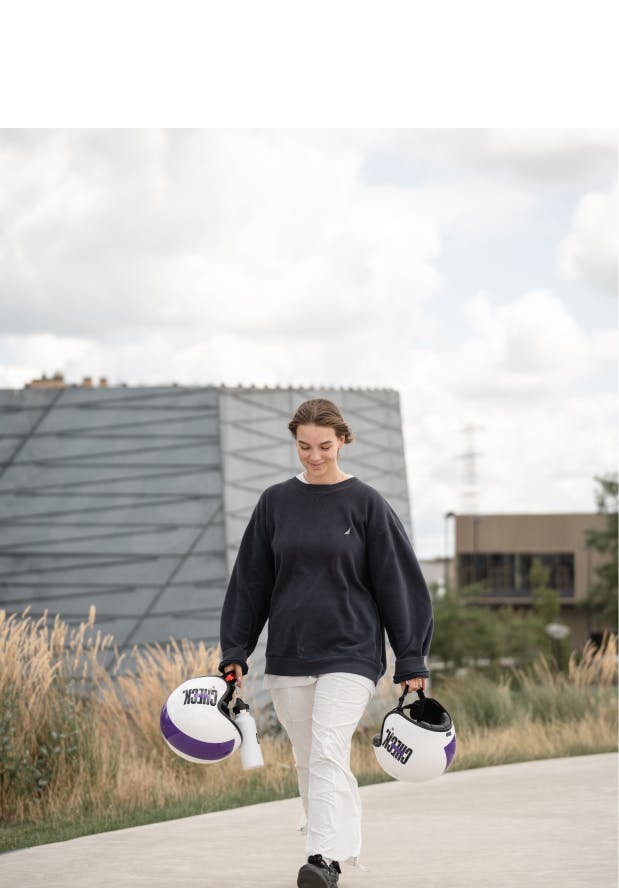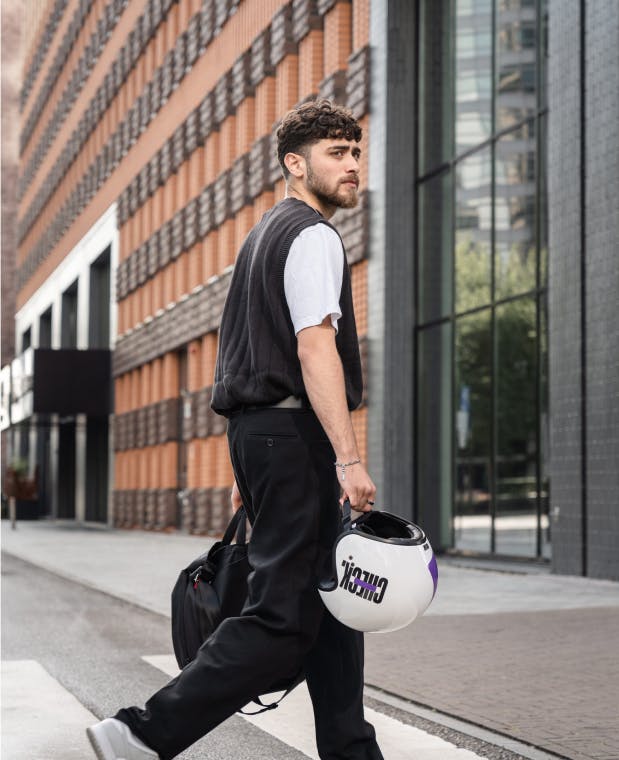Sustainability
Making cities more liveable.

Sustainability.
The mission of Check is to create liveable cities. By offering a dense network of shared electric cars and mopeds, an alternative for private transport by car is created. Fewer (polluting) cars lead to more spacious streets, a more rapid traffic flow, a more silent environment and cleaner air.
Every individual and every company has a responsibility to conduct its activities in a sustainable manner. Check strives to be a frontrunner within the shared mobility sector with regard to sustainability ambition and transparency, and inspire others to do the same. Together with consultancy firm New Economy, Check created insight into its CO2-emission and formulated ambitious reduction goals.

The goal.
The CO₂ emission of Check per passenger kilometre is reduced by 50% in 2030 (base year: 2022).
The insight.
Together with consultancy firm New Economy, Check has created insight into its CO2-emission in 2022. The insight was created in line with the Greenhouse Gas Protocol (GHG). The chargement of the batteries, the production of mopeds, kickscooters and spare parts, and the air freight of spare parts are together responsible for 87% of all emissions.
Emission per passenger kilometre.
The CO2-emission in 2022 is measured as an absolute number. Following the advice from New Economy, Check uses the scientifically backed Sectoral Decarbonization Approach (SDA) to formulate its reduction goals. With SDA, Check can zoom in on the CO2-emission per product sold: a passenger-kilometre. Together with New Economy, Check depicted the construction of the CO2-emission per passenger-kilometre:



REDUCE CO2-EMISSION BY 50% PER PASSENGER-KILOMETRE IN 2030.
Together with New Economy, Check formulated and computed measurements that have to be realised between 2022 and 2030 in order to achieve the 50% reduction in CO2-emission:
Convert all energy contracts at all locations to renewable energy (reduction potential: 4,8 gram CO2-eq per passenger-kilometre)
Extend the lifespan of the three most CO2-heavy moped parts: the motor, the batteries and the aluminium: (reduction potential: 2,5 gram CO2-eq per passenger-kilometre)
Formulating and adhering to a sustainable purchasing policy for mopeds and spare parts with an internal price on CO2 (reduction potential: 2,5 gram CO2-eq per passenger-kilometre)
Increase the average number of passengers per trip from 1,3 to 1,4 (reduction potential: 2,4 gram CO2-eq per passenger-kilometre)
Optimise inventory management and thereby prevent last-minute spare parts transport by plane (reduction potential: 1,1 gram CO2-eq per passenger-kilometre)
Make the daily commute and business travel of all Check employees emission-free (reduction potential: 0,8 gram CO2-eq per passenger-kilometre)
In 2030, these accumulated measurements will lead to a reduction of 14,1 gram CO2-eq per passenger-kilometre. This means that every passenger-kilometre will still emit 14,2 gram CO2-eq. This is a reduction of 50% of the emission in 2022.
Current measures.
Currently, Check is already taking some measurements in reducing its CO2-footprint.
With exception of one operational bus, Check exclusively has electric vehicles in its fleet (commercial and operational)
If possible, Check buys mopeds, batteries and spare parts second hand. Naturally, a safety standard is applied.
Check is a partner of the Flexport Carbon Footprint Offset Program. With this program, all CO2-emission from ship freight is compensated.
Check has a partnership with Seenons, a circular waste processor. The aim is to have zero-waste hubs by the end of 2024. This means that all operational hubs will only produce waste streams that can be recycled.
All energy contracts that are concluded by Check are 100% renewable Dutch wind energy.
ADDITIONAL GOALS.
In addition to a 50% reduction per passenger-kilometre, Check has conveyed its ambition to contribute to a broader diminishment of emissions in the production of spare parts and the usage of mopeds. Check realises this by making its data available to and participating in relevant researches related to these topics. In 2023 and 2024, Check will identify in which way its data could contribute to reduction in the sector. Moreover, Check will pinpoint multiple research initiatives to participate in in 2025.
These could include, but are not limited to:
A hackathon with students on reducing usage emissions
Research projects on possibilities to nudge users towards energy efficient behaviour
Possibilities to extend the lifespan of the three most CO2-heavy moped parts (motor, batteries, aluminium)
A consortium with a wide range of reduction goals on urban mobility
Research possibilities on predictive maintenance
Check strongly invites every research initiative that recognizes itself in the description above to get in touch.
HOW GREEN IS A SHARED MOPED?
CE Delft conducted a research in 2022 on CO2-emission of the shared moped in comparison to other transport alternatives. The research shows that the shared moped is a relatively sustainable form of transport: only the bike and the electric private moped emit fewer CO2 per passenger-kilometre.
Source: CE Delft (2022)
Questions or issues? Reach out via email at support@ridecheck.app. We’ll get back to you as soon as possible.
Check Technologies B.V.With using functional- and analytical cookies, we make our website more accessible for our customers. This only requires your permission. For questions about our use of cookies, find our privacystatement here.